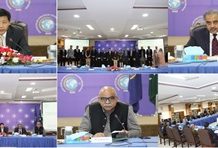Finally, Japan’s postwar pacifist constitution has been reinterpreted, ending a 70 year ban on the Japanese military. The move is historical and crucial, and will convert Japan into a ‘normal’ state. The hawkish are on the winning side. They did what they wanted to do in the past three decades. Earlier, these LDP conservatives came up with a law permitting the Japanese army to support the US and the allies’ ships in the Indian Ocean during 2001-10 in their drive against counter-terrorism. This law has become the rationale under which the new decision was made from self-defense to collective self-defense.
Which way should Japan move to now? Should it continue to be a pacifist nation or become militarily assertive to tackle new challenges in the region? Geo-strategic challenges are immense for Japan in North East Asia. Even North Korea, with a GDP of US$ 12 billion only, has emerged as a nuclear power state since 2006, and is threatening Japanese interests. Some improvements have occurred between them on the abductees’ issue. China has been on the rising path for quite some time, with uncomfortable relations with the Japanese on many historical issues including the Senkaku / Diaoyu Island in the South China Sea.
The Japanese Cabinet made a historical decision on July 1st by reinterpreting the Japanese pacifist constitution of 1947, drafted by the Americans after the war. The constitution disabled the Japanese military. Japan was not allowed to maintain an army and to resort to war to settle international disputes through the use of force. Japanese leaders often lamented that Japan was not permitted to participate in collective self-defense or aid allies in emergency situations.
Albeit controversial at home and abroad, the Cabinet’s resolution is a historical move ending a 70 year ban on the Japanese military to participate in global disputes under three conditions: (1) If Japan is attacked, (2) If its citizens are attacked, (3 ) In case its allies need Japan’s military help. After the Cabinet decision, Japanese authorities have to enact a number of laws to implement the decision through a legal framework.
It seems that in prevailing circumstances, the United States will be chief beneficiary of such Japanese military support abroad to keep US power in Afghanistan and the fast deteriorating political situation in the Middle East in check. This is the real burden-sharing by Japan to support US war goals in many parts of the world, asked for by the United States since the 1980s.
Japanese leaders and lawmakers remained reluctant to lend such offers at the time. They only offered non-combat support in Afghanistan and during the first Gulf war. Japanese peacekeeping operations (PKO) were of a non-military nature to help the allied forces under the United Nations. Now, it seems all such restrictions have been removed and like a normal state, Japan will offer military assistance at the UN and allies’ request.
The decision irked many in the region. The Chinese spokesman of the Ministry of Foreign Affairs Hong Lei reacted by stating that it is simply a ‘rubber-stamp’ decision. He went on to say that ‘Japan must respect its neighbors’ security concerns, not harm the national sovereignty and security interests of China and not undermine regional peace and stability.’ South Korea also reacted but refrained from sharp criticism.
The Pakistan army has a pleasant experience of cooperating with the Japanese SDF in a multilateral manner during its Indian Ocean mission 2001-10 for re-fueling and fresh-water supply. There are many other defense exchanges between SDF and Pakistan army. The Japanese SDF played a role during the floods in Pakistan in 2010. The reinterpretation of the Japanese constitution would enhance more room for future defense cooperation between the two nations.
This, however, depends on the Abe Administration’s decision about creating a balance between offering civil nuclear cooperation to both India and Pakistan by removing discrimination leveled against Pakistan by not offering the same. Otherwise, Japan will not be able to maintain a balance in its military approach towards South Asia i.e. equality and neutrality. Let’s see how the Abe Administration reacts to such demands.
Views expressed are of the author and do not necessarily reflect the views of ISS or of the Government of Pakistan.













